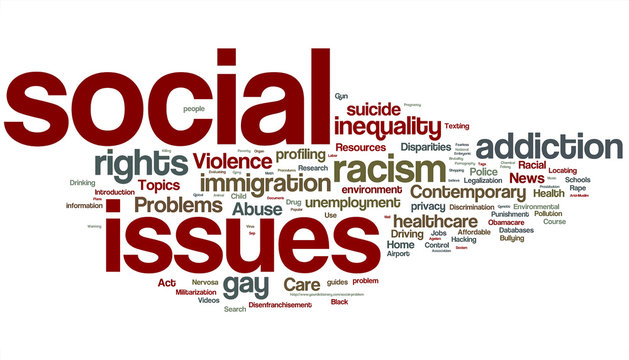Table of Contents
Introduction to Social Issues
Social issues refer to problems or concerns that affect large segments of society. They can manifest in various forms, including economic inequality, discrimination, and environmental degradation. Understanding and addressing these issues is crucial for fostering a more equitable and just world.
Definition and Importance
At its core, a social issue is any condition or problem that negatively impacts individuals or groups within a society. These issues often stem from systemic injustices and disparities in power, wealth, and resources. Addressing homesdecoratingblog.com is essential for promoting social justice, equality, and human rights.
Examples of Social Issues
Social issues can take many forms, ranging from poverty and homelessness to racism and gender inequality. They can also include issues such as access to healthcare, education, and affordable housing. Identifying and addressing these issues requires a multi-faceted approach that takes into account their underlying causes and impacts.
The Impact of Social Issues
Social issues have far-reaching consequences that affect individuals, communities, and societies as a whole. From economic downturns to psychological distress, the effects of these issues can be profound and long-lasting.
Economic Effects
One of the most significant impacts of social issues is their effect on the economy. Poverty, for example, can lead to decreased productivity, increased healthcare costs, and higher rates of crime. Similarly, discrimination in the workplace can result in lost opportunities and reduced economic growth.
Psychological Effects
Social issues can also take a toll on individuals’ mental and emotional well-being. Discrimination, harassment, and marginalization can lead to stress, anxiety, and depression. Moreover, the stigma surrounding certain issues, such as mental illness, can exacerbate feelings of shame and isolation.
Societal Effects
At a societal level, social issues can undermine social cohesion and trust. When certain groups are marginalized or oppressed, it can lead to social unrest and conflict. Moreover, inequitable access to resources and opportunities can perpetuate cycles of poverty and disadvantage.
Causes of Social Issues
Understanding the root causes of social issues is essential for developing effective solutions. These causes are often complex and interconnected, stemming from a combination of economic, political, and social factors.
Economic Disparities
Many social issues can be traced back to economic disparities and inequalities. Wealthy individuals and corporations may wield disproportionate power and influence, exacerbating social divisions and injustices. Addressing economic inequality is crucial for promoting social justice and equal opportunity.
Discrimination
Discrimination based on race, gender, ethnicity, sexual orientation, or other factors is a pervasive problem that fuels many social issues. Prejudice and bias can lead to unequal treatment in areas such as employment, education, and healthcare, perpetuating systemic injustices and disparities.
Political Instability
Political instability and corruption can also contribute to social issues by undermining governance, rule of law, and public trust. Weak or ineffective government institutions may fail to address pressing social problems, leading to social unrest and conflict.
Types of Social Issues
Social issues can manifest in various forms, each with its own unique challenges and implications. Understanding these different types of issues is essential for developing targeted interventions and strategies.
Poverty
Poverty is perhaps the most pervasive social issue facing humanity today. It encompasses a lack of access to basic necessities such as food, shelter, and healthcare, as well as limited opportunities for education and employment. Addressing poverty requires comprehensive solutions that tackle its root causes and empower individuals and communities.
Racism
Racism is a form of discrimination and prejudice based on race or ethnicity. It can take many forms, including overt acts of bigotry and more subtle forms of bias and microaggressions. Combatting racism requires challenging systemic inequalities and fostering greater understanding and empathy across racial and ethnic lines.
Gender Inequality
Gender inequality refers to disparities in power, resources, and opportunities between men and women. It manifests in various areas of life, including employment, education, politics, and healthcare. Achieving gender equality requires dismantling patriarchal structures and promoting policies and practices that empower women and girls.
Climate Change
Climate change is a pressing social issue with far-reaching implications for human societies and the planet. It is driven by factors such as greenhouse gas emissions, deforestation, and industrial pollution. Addressing climate change requires collective action at the local, national, and global levels to reduce emissions, adapt to changing conditions, and promote sustainable practices.
Mental Health Stigma
Mental health stigma refers to the negative attitudes and beliefs surrounding mental illness. It can lead to discrimination, social exclusion, and barriers to seeking help and support. Combatting mental health stigma requires raising awareness, challenging stereotypes, and promoting compassionate and inclusive attitudes towards mental health issues.
Case Studies on Social Issues
Examining real-world examples can provide valuable insights into the complexities of social issues and the strategies employed to address them. Here are a few notable case studies:
Poverty in Developing Countries
In many developing countries, poverty is a widespread and entrenched problem that affects millions of people. Organizations such as Oxfam and CARE are working to alleviate poverty through initiatives that focus on education, healthcare, and economic empowerment.
Civil Rights Movement
The Civil Rights Movement in the United States was a pivotal moment in history that challenged racial segregation and discrimination. Led by activists such as Martin Luther King Jr. and Rosa Parks, the movement helped secure legal protections and civil rights for African Americans, paving the way for greater equality and justice.

